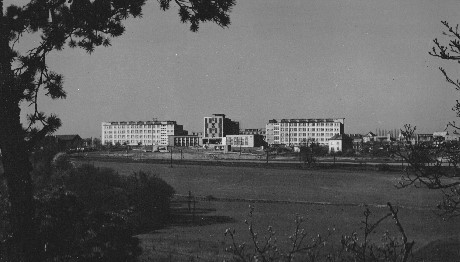The early origins of the Institute of Microbiology can be found already in 1948, when Prof. Ivan Malek set up a working group at the Medical faculty of the University of Hradec Kralove, which turned into a “foundation stone” of the Department of Microbiology of the Central Institute of Biology. Upon establishment of the Czech-Slovak Academy of Sciences in 1952, this group moved from Hradec Kralove to the newly formed Institute of Biology ASCR in Prague – Dejvice. However, it took another 10 years until the Institute of Microbiology ASCR was officially established in 1962. Two years later the last move from Prague-Dejvice to Prague-Krc materialized and ever since the Institute of Microbiology has been firmly based on the Krc’s campus as one of several institutes of ASCR. Since early days, the Algae and Gnotobiology sections situated in Trebon and Novy Hradek, respectively, are closely associated with the institute as two of its satellite units.
Since its official establishment the Institute of Microbiology ASCR was designed as a broad-spectrum scientific platform connecting various fields such as biological, technical, agricultural and medical microbiology as well as several immunological disciplines.
The world-wide fame of the Institute of Microbiology ASCR will be forever connected with its renowned founder and the first director, Prof. Ivan Málek, whose contribution to the advance of microbiology as a subject of study in former Czechoslovakia is well known. In particular, Prof. Malek was a successful pioneer in development of new methods of continuous cultivation of microorganisms. His appointment as a director unfortunately ended in December 1969 from political reasons.
The most important results achieved by the scientists of the Institute are:
Vaccine against anthrax (1961)
Mucidin – the only original Czech antibiotic in clinical use (Mucidermin SPOFA, 1956-8)
Technology of growing edible mushrooms (champignons, oyster mushrooms, shii-take; 1960-1980)
Optimization and efficiency increase of the production of penicillin and other antibiotics (current research)
Development of supportive drugs in the treatment of mononucleosis and other liver and prostate diseases, and dietary supplements with a positive effect on the immune system (current research)
Development of directed antitumor drugs (current research)
Technology of decontamination of soils polluted by oil substances, polycyclic hydrocarbons and polychlorinated biphenyls (current research)
Technology of production of algal biomass suitable for use in pharmacology and food industry (current research)
Technology of growing germ-free animals facilitating the development of new vaccines and drugs (current research)



